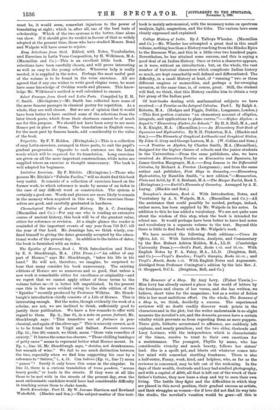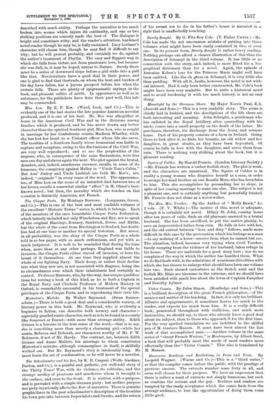The Romance of a Shop. By Amy Levy. (Fisher Unwin.)—
Miss Levy has already earned a place in the world of letters by the freshness and charm of her verses, and she has written, we believe, short tales for the magazines ; but as a writer of fiction this is her most ambitious effort. On the whole, The Romance of a Shop is, we think, decidedly a success. The experienced reviewer will no doubt readily discover weak points in the characters and in the plot; but the writer understands in no slight measure the novelist's art, and the dramatis personae have a certain vitality which prevents us from regarding them as mere puppets. Three girls, hitherto accustomed to affluence, are suddenly left orphans, and nearly penniless; and the two elder, Gertrude and Lucy Lorimer, with the independence which is characteristic of the times, resolve to trust to their own exertions for a maintenance. The youngest, Phyllis by name, who has considerable vivacity and much beauty, follows her sisters' lead. She is a spoilt pet, and blurts out whatever comes into her mind with somewhat startling frankness. There is also a half-sister, Fanny, weak, kind, and helpless, who, as far as the reviewer is concerned, may be left out of the reckoning. In the days of their wealth, Gertrude and Lucy had studied photography, and with a capital of £600, all that is left out of the wreck of their father's fortune, they now lease a shop and try to earn their own living. The battle they fight and the difficulties in which they are placed in this novel position, their gradual success as artists, and their struggles as women—for if love did not find its way into the studio, the novelist's vocation would be gone—all this is described with much ability. Perhaps the narrative is too much broken into scenes which injure its continuity, and one or two striking positions are scarcely made the best of. The dialogue is bright and sometimes witty, and the reader's attention, hardened novel-reader though he may be, is fully sustained. Lucy Lorimer's character will charm him, though he may find it difficult to say why ; but he will protest probably, and certainly we do, against the author's treatment of Phyllis. The easy and flippant way in which she falls from virtue, not from passionate love, but because she was dull, is, it may be hoped, untrue to Nature. Surely there must be a series of downward steps before a girl sinks into a gulf like that. Novel-writers have a good deal in their power, and one is glad to find that Gertrude, on whom the heat and burden of the day have fallen, has a joyous prospect before her when the curtain falls. There are plenty of epigrammatic sayings in the book, and pleasant sallies of mirth. In appearance as well as in substance, for the publishers have done their part well, this tale may be commended.



















































 Previous page
Previous page